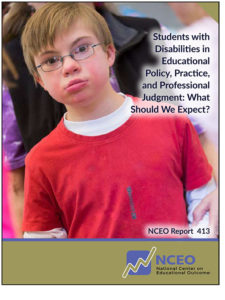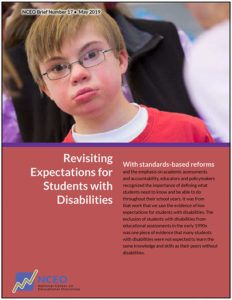 NCEO provides a cross-disciplinary introduction to topics in educational policy, practice, and law that have highlighted critical questions related to expectations for students with disabilities in Students with Disabilities in Educational Policy, Practice, and Professional Judgment: What Should We Expect? The purpose of the report is to help foster shared knowledge among people with diverse perspectives. It acknowledges and articulates what we know thus far about expectations for students with disabilities in the context of policy, practice, and evidence from implementation of reforms.
NCEO provides a cross-disciplinary introduction to topics in educational policy, practice, and law that have highlighted critical questions related to expectations for students with disabilities in Students with Disabilities in Educational Policy, Practice, and Professional Judgment: What Should We Expect? The purpose of the report is to help foster shared knowledge among people with diverse perspectives. It acknowledges and articulates what we know thus far about expectations for students with disabilities in the context of policy, practice, and evidence from implementation of reforms.
The three critical questions for discussing expectations that are addressed in the report are:
- What evidence do we have that there are students with disabilities who cannot achieve to the same level expected for other students, even after appropriate, evidence-based instruction in the general curriculum based on state standards set for all students?
- If there is compelling evidence that some students cannot achieve, can educators agree on and reliably determine which students with disabilities cannot be expected to learn to the same level, and why, even after appropriate evidence-based instruction?
- If some students cannot be expected to learn to the same level, how can an appropriately ambitious but different standard of expectation be defined for them to ensure they are not ignored or excluded from benefits that other students are receiving from school accountability?
The report examines educational perspectives on expectations for students with disabilities, highlighting what has been learned during the past four decades, and legal perspectives on expectations, including the Supreme Court cases of Rowley and Endrew F. It concludes with recommendations for action based on what thoughtful, informed professional judgment of appropriate educational opportunities for students with disabilities should be.
 A Brief titled, Revisiting Expectations for Students with Disabilities is based on the comprehensive paper Students with Disabilities in Educational Policy, Practice, and Professional Judgment: What Should We Expect? The Brief summarizes some of the past exclusionary practices applied to students with disabilities that resulted in low expectations for these students, along with how they were addressed in policies related to standards-based reform. It highlights the answers to the critical questions about expectations for students with disabilities, including those students with the most significant cognitive disabilities.
A Brief titled, Revisiting Expectations for Students with Disabilities is based on the comprehensive paper Students with Disabilities in Educational Policy, Practice, and Professional Judgment: What Should We Expect? The Brief summarizes some of the past exclusionary practices applied to students with disabilities that resulted in low expectations for these students, along with how they were addressed in policies related to standards-based reform. It highlights the answers to the critical questions about expectations for students with disabilities, including those students with the most significant cognitive disabilities.
The Brief concludes with suggestions for policymakers, states, and technical assistance providers. The suggestions focus on how to work with districts, schools, and educators to revisit expectations for students with disabilities.
